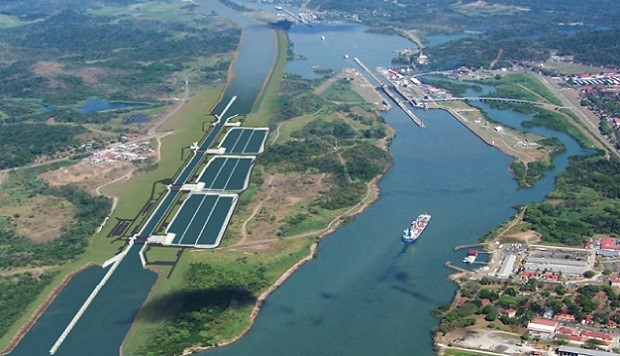 CHICAGO—The market for industrial real estate has in many ways never been better. The on-going expansion of e-commerce has distributors overhauling their supply chains and developers breaking ground on new facilities across the US that can handle the flow of products. But some experts say that behind all of this activity a few problems have become apparent with the global supply chain. The Panama Canal expansion is done, but the transit rates are quite high, and East Coast ports are not quite ready to handle the larger ships that can now make the trip. Furthermore, rates charged by ocean carriers has plunged due to overcapacity, putting these groups at risk, and inventories are not turning over as quickly as they were one year ago. What it all means is not yet clear, but after years of expansion, the specter of recession can't be dismissed. "From a real estate perspective, everybody is fat and happy because we have low vacancy rates," Kevin Turner , who leads Cushman & Wakefield ports and intermodal practice group, tells GlobeSt.com. He calls himself a "canary in a coal mine," and points out that truckers in the US are also not shipping enough product as inventories rise. Although the US economy has held up well in the midst of a global slowdown, after 68 months of expansion, "what comes next?" New truck orders are at a four-year low, according to a mid-year report just issued by Turner's group. And although surface freight shipments hit their highest point for the year in May, it was 5.8% below the rate one year earlier, and 7% lower than in May 2014. Furthermore, intermodal traffic in the first half of the year was down 2.1% versus 2015. "To me those are the early warning signs that we could be headed into a recession," Turner says. Owners of large-scale industrial real estate may never have been in a better position, considering the robust demand for their buildings, but “when you see the transportation element downshift, that tells me something,” says Turner.
CHICAGO—The market for industrial real estate has in many ways never been better. The on-going expansion of e-commerce has distributors overhauling their supply chains and developers breaking ground on new facilities across the US that can handle the flow of products. But some experts say that behind all of this activity a few problems have become apparent with the global supply chain. The Panama Canal expansion is done, but the transit rates are quite high, and East Coast ports are not quite ready to handle the larger ships that can now make the trip. Furthermore, rates charged by ocean carriers has plunged due to overcapacity, putting these groups at risk, and inventories are not turning over as quickly as they were one year ago. What it all means is not yet clear, but after years of expansion, the specter of recession can't be dismissed. "From a real estate perspective, everybody is fat and happy because we have low vacancy rates," Kevin Turner , who leads Cushman & Wakefield ports and intermodal practice group, tells GlobeSt.com. He calls himself a "canary in a coal mine," and points out that truckers in the US are also not shipping enough product as inventories rise. Although the US economy has held up well in the midst of a global slowdown, after 68 months of expansion, "what comes next?" New truck orders are at a four-year low, according to a mid-year report just issued by Turner's group. And although surface freight shipments hit their highest point for the year in May, it was 5.8% below the rate one year earlier, and 7% lower than in May 2014. Furthermore, intermodal traffic in the first half of the year was down 2.1% versus 2015. "To me those are the early warning signs that we could be headed into a recession," Turner says. Owners of large-scale industrial real estate may never have been in a better position, considering the robust demand for their buildings, but “when you see the transportation element downshift, that tells me something,” says Turner.  CHICAGO—The market for industrial real estate has in many ways never been better. The on-going expansion of e-commerce has distributors overhauling their supply chains and developers breaking ground on new facilities across the US that can handle the flow of products. But some experts say that behind all of this activity a few problems have become apparent with the global supply chain. The Panama Canal expansion is done, but the transit rates are quite high, and East Coast ports are not quite ready to handle the larger ships that can now make the trip. Furthermore, rates charged by ocean carriers has plunged due to overcapacity, putting these groups at risk, and inventories are not turning over as quickly as they were one year ago. What it all means is not yet clear, but after years of expansion, the specter of recession can't be dismissed. "From a real estate perspective, everybody is fat and happy because we have low vacancy rates," Kevin Turner , who leads Cushman & Wakefield ports and intermodal practice group, tells GlobeSt.com. He calls himself a "canary in a coal mine," and points out that truckers in the US are also not shipping enough product as inventories rise. Although the US economy has held up well in the midst of a global slowdown, after 68 months of expansion, "what comes next?" New truck orders are at a four-year low, according to a mid-year report just issued by Turner's group. And although surface freight shipments hit their highest point for the year in May, it was 5.8% below the rate one year earlier, and 7% lower than in May 2014. Furthermore, intermodal traffic in the first half of the year was down 2.1% versus 2015. "To me those are the early warning signs that we could be headed into a recession," Turner says. Owners of large-scale industrial real estate may never have been in a better position, considering the robust demand for their buildings, but “when you see the transportation element downshift, that tells me something,” says Turner.
CHICAGO—The market for industrial real estate has in many ways never been better. The on-going expansion of e-commerce has distributors overhauling their supply chains and developers breaking ground on new facilities across the US that can handle the flow of products. But some experts say that behind all of this activity a few problems have become apparent with the global supply chain. The Panama Canal expansion is done, but the transit rates are quite high, and East Coast ports are not quite ready to handle the larger ships that can now make the trip. Furthermore, rates charged by ocean carriers has plunged due to overcapacity, putting these groups at risk, and inventories are not turning over as quickly as they were one year ago. What it all means is not yet clear, but after years of expansion, the specter of recession can't be dismissed. "From a real estate perspective, everybody is fat and happy because we have low vacancy rates," Kevin Turner , who leads Cushman & Wakefield ports and intermodal practice group, tells GlobeSt.com. He calls himself a "canary in a coal mine," and points out that truckers in the US are also not shipping enough product as inventories rise. Although the US economy has held up well in the midst of a global slowdown, after 68 months of expansion, "what comes next?" New truck orders are at a four-year low, according to a mid-year report just issued by Turner's group. And although surface freight shipments hit their highest point for the year in May, it was 5.8% below the rate one year earlier, and 7% lower than in May 2014. Furthermore, intermodal traffic in the first half of the year was down 2.1% versus 2015. "To me those are the early warning signs that we could be headed into a recession," Turner says. Owners of large-scale industrial real estate may never have been in a better position, considering the robust demand for their buildings, but “when you see the transportation element downshift, that tells me something,” says Turner.
Want to continue reading?
Become a Free ALM Digital Reader.
Once you are an ALM Digital Member, you’ll receive:
- Breaking commercial real estate news and analysis, on-site and via our newsletters and custom alerts
- Educational webcasts, white papers, and ebooks from industry thought leaders
- Critical coverage of the property casualty insurance and financial advisory markets on our other ALM sites, PropertyCasualty360 and ThinkAdvisor
Already have an account? Sign In Now
*May exclude premium content© 2024 ALM Global, LLC, All Rights Reserved. Request academic re-use from www.copyright.com. All other uses, submit a request to [email protected]. For more information visit Asset & Logo Licensing.








